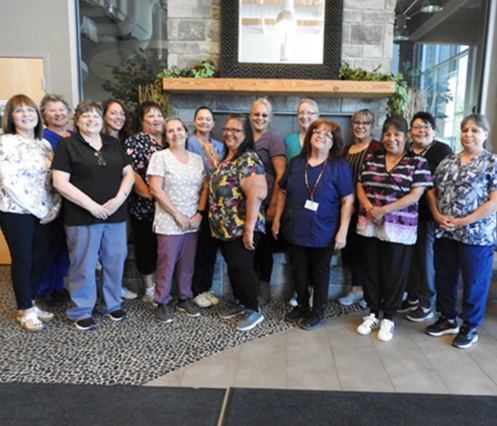VON partners with First Nations healthcare providers to deliver culturally sensitive hospice and palliative care

VON is proud to partner with Aamjiwnaang and Kettle and Stony Point First Nations to support community members in receiving culturally sensitive, in-home hospice and palliative care.
“Through this partnership, VON provides specialized training to Indigenous personal support workers (PSWs) so they become qualified as healthcare technicians (HCTs),” says Deborah Schmidt, RN, VON Director of Home and Community Care – eHomecare. “In this way, clients receive compassionate care from their community members in their own homes for their palliative or end-of-life journeys.”
VON’s eHomecare program is an innovative, team-based approach to in-home care that has a directing registered nurse (DRN) oversee and guide the work of HCTs, who deliver care in clients’ homes, acting as the eyes, ears and hands of the DRN.
HCTs send data and observations to the nurse remotely. The nurse assesses that information and provides direction to the healthcare technician at the bedside. One nurse can supervise several HCTs, allowing VON and First Nations partners to care for more clients in their homes.
Through this unique partnership, VON DRNs work with First Nations HCTs on an ongoing basis. HCTs are trained in enhanced skills, including providing pain medications with the real-time support of the registered nurse. They can also manage oxygen, gastrostomy tubes, catheters, blood sugar testing, medication administration and more.
VON nurses in the program complete cultural training to assist them in working with Indigenous populations and recognizing cultural practices associated with the end-of-life journey. For example, there might at times be ceremonial drumming at the patient’s bedside.
Deborah co-presented at a 2023 Hospice and Palliative Care Ontario (HPCO) conference with Robin Wood, RN, of Aamjiwnaang First Nation Hospice Like Space Project. The two told attendees that, while the preference for palliative care services for Indigenous people is to be at home, research has demonstrated gaps in care for the Indigenous community. These gaps, coupled with the need for culturally safe, palliative home care programs, were further highlighted by the COVID-19 pandemic.
In order to bridge the gaps, and building on the existing eHomecare model of Hospice at Home (H@H), VON worked in partnership with Aamjiwnaang First Nation to co-design a model of home-based palliative care specifically for First Nations communities. The co-designed model empowers and validates the ability of Indigenous communities to decide matters that impact their communities and their care.
VON and Aamjiwnaang used a collaborative, strengths-based approach to develop a path towards end-of-life that reflects the Indigenous history, culture and traditions that will increase inclusive and culturally relevant access to end-of-life care in First Nations communities.
Training of personal support workers continues today, with another class of Kettle and Stony Point PSWs receiving qualifications in late 2024 and a class of Aamjiwnaang PSWs undergoing training now.
At the start of her journey as an HCT, Connie told the team, “I will have the privilege to walk hand and hand with a person during their final season here on earth. I am honoured to be in this circle.”
About our partners
Aamjiwnaang First Nation is a First Nations community of about 2,500 Chippewa Aboriginal peoples, located on the St. Clair River, in the city limits of Sarnia, Ontario. Their heritage language is Ojibwa. The name Aamjiwnaang, (pronounced am-JIN-nun) means “at the spawning stream.”
The Chippewas of Kettle and Stony Point First Nation is located in southern Ontario along the shores of Lake Huron, 35km from Sarnia, Ontario. The community has 1,000 members who live on the reserve and 900 who live off the reserve.


